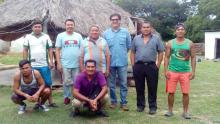Land Library
Bienvenue dans la bibliothèque du Land Portal. Explorez notre vaste collection de ressources en libre accès (plus de 74 000), comprenant des rapports, des articles scientifiques, des articles de recherche, des publications évaluées par des pairs, des documents juridiques, des vidéos et bien plus encore.
/ library resources
Showing items 46 through 54 of 270.El pueblo Ye´kwana tiene un patrón de asentamiento ribereño y disperso a lo largo de la cuenca del rio Caura, sus comunidades están asentadas en la selva y pese a la influencia de la iglesia evangélica y católica, los ye´kwana mantienen aún su organización política propia, basada en las autoridad
This new report by the PBL Netherlands Environmental Assessment Agency in collaboration with the Clingendael Institute and other Dutch research institutes points to pressure on security and migration arising from too litt
This Climate-Fragility profile is envisaged as a first component of a Climate-Fragility Risk Assessment process. It summarizes the key challenges the Lake Chad region is experiencing as a consequence of the interplay between climate change and fragility.
De regreso a Chile, Raimundo trae la experiencia académica y de vida, vuelve impregnado de la idea que tiene el campo y la agricultura como opción.
The Climate Change and International Security Resource Guide is produced for the Brussels Dialogue on Climate Diplomacy (BDCD) which consists of a series of informal meetings to exchange information and promote cooperation among European institutions and international organisations active in the
Mientras Anämëi se alejaba, se iba hundiendo lentamente enla tierra como despidiéndose. Si vuelve a ocurrir un incendiode esa magnitud, los Harakbut tenemos la seguridad de quevolverá otra vez para salvarnos
Conflict and climate change have pushed 124 million people in 51 countries into acute food security, a situation when the inability to consume adequate food represents an immediate danger to people’s lives and livelihoods.
A comunidade de Pilões tem origem a partir de uma ocupação realizada por 25 famílias numa propriedade de 780,4625 hectares, situada na região de Jacobina, noroeste da Bahia, extremo Norte da Chapada Diamantina.
são 18 pequenas comunidades camponesas espalhadas pela caatinga, território remanescente de terras públicas devolutas, somando 144 mil hectares e uma Estimativa de 800 famílias.








